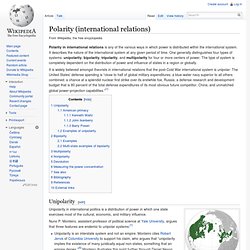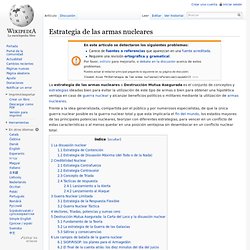

Polarity (international relations) Polarity in international relations is any of the various ways in which power is distributed within the international system.

It describes the nature of the international system at any given period of time. One generally distinguishes four types of systems: unipolarity, bipolarity, tripolarity, and multipolarity for four or more centers of power. The type of system is completely dependent on the distribution of power and influence of states in a region or globally. NATO and countries with which it is supposed to be at peace account for over 70% of global military expenditure,[2] with the United States alone accounting for 43% of global military expenditure[3] in 2009 and more than the next 17 combined in 2010[4] with NATO then taking about half of the global $1.6 trillion.[5] Unipolarity in international politics is a distribution of power in which one state exercises most of the cultural, economic, and military influence.
Estrategia de las armas nucleares. La estrategia de las armas nucleares o Destrucción Mutua Asegurada es el conjunto de conceptos y estrategias ideadas bien para evitar la utilización de este tipo de armas o bien para obtener una hipotética ventaja en caso de guerra nuclear y alcanzar beneficios políticos o militares mediante la utilización de armas nucleares.

La disuasión nuclear[editar] La disuasión nuclear es un fenómeno psicológico y defensivo basado en la existencia de las armas nucleares y que descansa sobre las apreciaciones subjetivas de las intenciones. Retaliate - Buscar con Google.